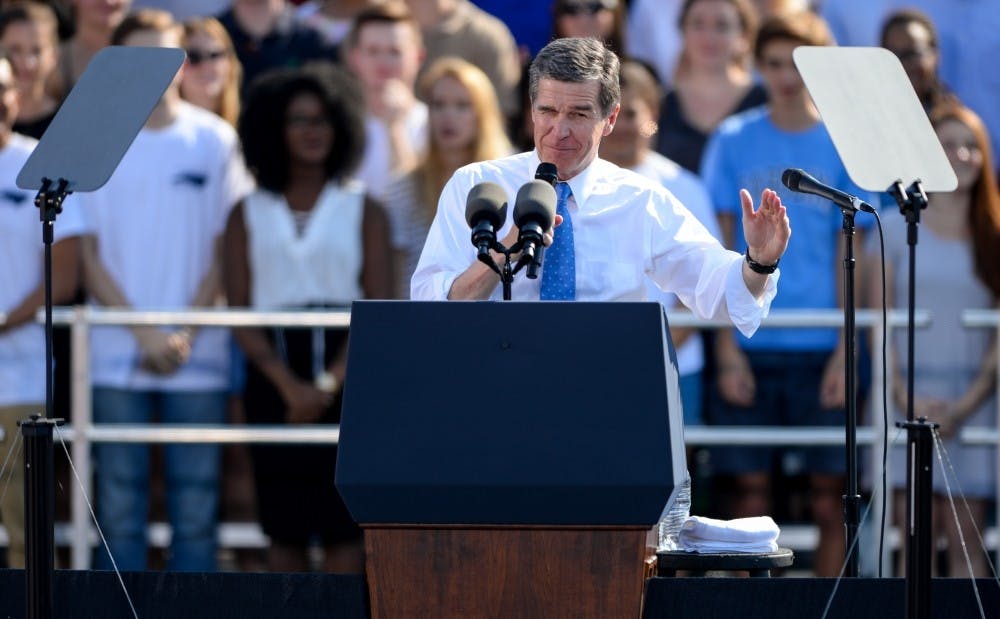Governor Roy Cooper recently signed an executive order on climate change, setting goals for the state's economy to reduce greenhouse emissions 40 percent from earlier levels by 2025.
How much of an effect is the order likely to have, and what does it mean for Duke?
Cooper's order has agency through state agencies, but does not have the same power as legislation. The order creates the state's first climate change committee—the North Carolina Climate Change Interagency Council.
“These goals by themselves do not really have much effect,” wrote Billy Pizer, faculty fellow in the Nicholas Institute for Environmental Policy Solutions and Susan B. King Professor of Public Policy, in an email to the Chronicle. "Any real action will require legislation."
The order, signed Oct. 29, bases the emissions levels on 2005 estimates. Therefore, according to the News and Observer, the state has already cut emissions by 25 percent, and has only 15 percent more to go to reach the 40 percent goal.
Although these are not mandates across the entire state, Cooper can work toward these goals through executive agencies. The order directed the state Commerce Department to invest in "clean technology" and called on all cabinet agencies to prioritize using zero-emissions vehicles for trips, when possible.
“There is no silver bullet to fight climate change," said Tim Profeta, director of the Nicolas Institute for Environmental Policy Solutions. "There is a silver buckshot. You have to use a little bit of everything, and I think that's what the Governor is trying to do."
Profeta said that by opening the North Carolina electricity market to renewable energy such as wind and solar power, competition may allow these technologies to capture a larger market share. He also added that nuclear energy can be used and would contribute to the reduction of carbon emissions.
“As head of the executive branch, Governor Cooper oversees a lot of the energy companies that produce greenhouse gas emissions," Profeta noted. "He has both the authority to influence and use a carrot to get those companies to adapt clean air technology and open the market to clean air technologies. He also has the authority as a regulator to push the companies to reduce greenhouse gas reductions."
The order pushes for more electric cars on the road, which potentially compounds the impact of transferring the electricity grid to more renewable energy—more cars would run on electricity and the electricity grid would be run through renewable resources.
According to a recent update on Duke's plan to become carbon neutral by 2024, the University would have to cut 84 percent more of its emissions within the next six years. The executive order could make Duke’s tasks easier.
Duke’s greenhouse gas emissions come in large part from three places: the steam plants on campus, the power bought from Duke Energy and the emissions from employee vehicles. Cooper is attempting to reduce the greenhouse gas emissions from electricity and putting more electric vehicles on the road, Duke's carbon neutral goal could benefit.
“If he moves the North Carolina economy away from greenhouse gas emissions, that should mean that Duke’s operations should move away from greenhouse gas emissions,” Profeta said.
Cooper’s executive order falls in line with a trend—which began when President Donald Trump pulled out of the Paris Climate Accords in 2017—of states taking action on their own to address climate change and curb emissions. Previously, Cooper added the state to the U.S. Climate Alliance in response to Trump's decision.
“With the federal government taking a back seat with fighting climate change, the state governments have come into the fore in taking action and asserting leadership over the issue," Profeta said. "That’s one of the good things about the U.S. system of government, that you have the ability of state actors to push forward."
He noted that the federal government still has the ability to move the economy with more impact than any individual state. Federal leadership would make the push against climate change more robust.
“Cooper’s leadership not only puts North Carolina in a leadership position in fighting climate change, but it positions the North Carolina economy to be savvy and smart about this when federal leadership could come back to the equation,” Profeta said.
Get The Chronicle straight to your inbox
Sign up for our weekly newsletter. Cancel at any time.

